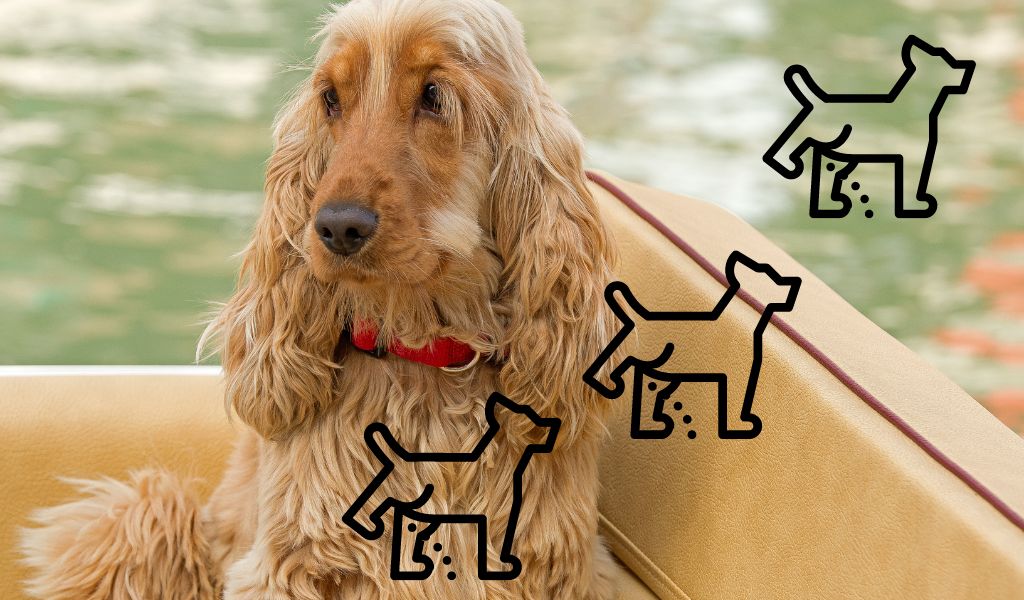Is your Cocker spaniel regularly urinating in the house? Are you frustrated with trying to figure out why and how to stop it from happening?
We all know that an untrained dog can cause a variety of problems – from excessively barking to mischievous behaviour.
But no problem frustrates us more than when our beloved pets pee inside the house.
Of course, accidents can happen occasionally but if your pup seems to be relieving himself on a regular basis in your home, it’s time you took some action.
In this blog post, we will provide tips on how to talk steps towards preventing your Cocker spaniel from peeing indoors and how best to tackle any existing issues.
Peeing in the house is a common issue among Cocker spaniels. This behaviour is often a sign of a larger problem, such as a medical issue or anxiety, and it is important to address the root cause in order to effectively stop it. However, with a little patience and training, it is possible to help your Cocker Spaniel stop peeing in the house and live a happy, healthy life.
Understanding the reasons behind peeing in the house
The first step in stopping your Cocker spaniel from peeing in the house is to understand the reasons behind the behaviour.
There are several factors that may contribute to this behaviour, including:
Medical issues
If your Cocker spaniel is suddenly peeing in the house, it may be a sign of a medical issue, such as a bladder infection or urinary tract problems.
It is important to have your pet checked by a veterinarian to rule out any underlying health problems.
Separation anxiety
If your Cocker spaniel only pees in the house when you are not home, it may be a sign of separation anxiety.
This can be a serious issue and may require the help of a professional dog trainer or behaviourist.
Lack of house training
If your Cocker spaniel is a puppy or was not properly house trained, they may not understand that it is not appropriate to pee in the house.
You are the problem
If you fail to pay attention to your dog and don’t take him out often enough then, it’s a given that at some point he will be unable to hold on and will pee indoors.
It’s important for you to realise and understand that, just as you need the toilet from time to time, your dog has similar needs and he cannot hang on indefinitely while you sort your life out.
By behaving like a responsible grown up you can prevent most dog accidents.

Providing plenty of toilet breaks
One of the key ways to help your Cocker spaniel stop peeing in the house is to make sure they have plenty of opportunities to go outside.
This may mean taking them out more frequently, or taking them for longer walks to ensure that they have enough time to relieve themselves.
If your Cocker spaniel is a puppy, it is also important to take them out after meals and naps, as these are times when they are most likely to need to go to the toilet.
Consistency and patience
Training your Cocker spaniel to stop peeing in the house requires consistency and patience.
It is important to remain calm and positive, and to never punish your pet for accidents.
Instead, use positive reinforcement techniques, such as giving them treats and praise when they go outside.
It is also important to clean up any accidents thoroughly, as the scent can attract your dog to pee in that same spot again.
Implementing a house training schedule
In order to effectively house train your Cocker spaniel, it is important to have a set schedule.
This may involve taking them out first thing in the morning, before bed, and at regular intervals throughout the day.
It is also helpful to have a designated area outside, and to take your Cocker spaniel to the same spot every time they go out.
The main causes of Cocker spaniels peeing indoors are..
Lack of proper house training
Poor supervision by owners and a failure to understand the dog’s needs
Illness or other medical condition
Anxiety which can be caused by separation or other factors
Providing plenty of exercise and mental stimulation
In addition to providing plenty of breaks, it is also important to make sure your Cocker spaniel is getting plenty of exercise and mental stimulation.
This may include taking them for walks, playing fetch, or training them to perform tricks.
Engaging in regular physical and mental activity can help to reduce stress and anxiety, and can also help to prevent accidents in the house.
Seeking professional help
If your Cocker continues to pee indoors despite your efforts to stop the behaviour, it may be necessary to seek professional help.
A professional dog trainer or behaviourist can help you to identify and address the root cause of the issue, and can provide you with specific training techniques and strategies to help your pet overcome the behaviour.
They can also work with you to create a personalized plan that is tailored to your pet’s needs and can help you to achieve your goal of having a clean and dry house.
Final Words
Peeing in the house can be a frustrating and challenging issue for Cocker spaniel owners, but with patience and proper training, it is possible to help your pet stop this behaviour.
By understanding the reasons behind the behaviour, providing plenty of breaks, being consistent and patient, implementing a house training schedule, providing plenty of exercise and mental stimulation, and seeking professional help if necessary, you can help your Cocker spaniel live a happy and healthy life, free from accidents in the house.
FAQs
How do I know if my Cocker spaniel has a medical issue causing them to pee in the house?
If your pet suddenly starts peeing in the house, it is important to have them checked by a veterinarian to rule out any underlying medical issues.
Symptoms of a medical issue can include frequent urination, pain while urinating, and accidents indoors.
How do I address separation anxiety in my Cocker spaniel?
Separation anxiety can be a serious issue for Cocker spaniels, and may require the help of a professional dog trainer or behaviourist.
Strategies for addressing separation anxiety may include gradually increasing the amount of time your pet spends alone, providing plenty of mental stimulation, and using positive reinforcement techniques, such as giving treats and praise when they are calm and relaxed.
How often should I take my Cocker spaniel out?
The frequency at which you should take your Cocker spaniel out to go to the toilet will depend on several factors, including their age, size, and activity level.
As a general rule, it is recommended to take them out first thing in the morning, before bed, and at regular intervals throughout the day.
What should I do if my Cocker spaniel has an accident in the house?
If your Cocker spaniel has an accident in the house, it is important to clean it up thoroughly.
This will help to remove any scent that may attract them to go potty in the same spot again.
It is also important to remain calm and not punish your pet for the accident, as this can make the behaviour worse.
What is the best way to house train my Cocker spaniel?
The best way to house train your Cocker spaniel will depend on your pet’s individual needs and personality.
However, a common method is to implement a house training schedule, provide plenty of breaks, use positive reinforcement techniques, and seek professional help if necessary.
With patience and consistency, you can help your Cocker spaniel learn to stop peeing in the house and live a clean and happy life.




